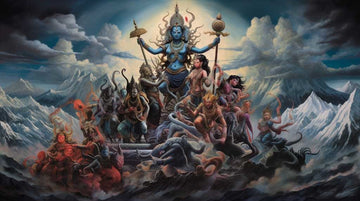The Power of the Divine in Hinduism
Hindu mythology is a vast and intricate tapestry, filled with gods who possess extraordinary powers, each embodying unique aspects of creation, preservation, and destruction. Unlike many other mythologies, Hinduism’s pantheon includes deities who serve specific purposes but also embody profound lessons on life, spirituality, and the cosmos. From the powerful trinity of Brahma, Vishnu, and Shiva, to the fierce forms of Durga and Kali, these deities are worshipped for their divine strength, wisdom, and virtues. In this article, we explore some of the most powerful gods in Hinduism, delving into their stories, powers, and the lessons they impart.
1. Brahma: The Creator of the Universe
Brahma, the god of creation, is part of the Trimurti (trinity) in Hindu mythology, along with Vishnu and Shiva. Known as the creator of all life and the universe, Brahma is often depicted with four heads, symbolizing his ability to look in all directions and his vast knowledge. According to mythology, he was born from a lotus that emerged from Vishnu’s navel, symbolizing the beginning of all existence.
Powers and Significance: Brahma’s role as the creator represents the birth of all life and the continuous cycle of creation. Though he is less commonly worshipped today compared to other deities, his significance as the source of existence remains paramount.
Lesson from Brahma: Brahma’s story reminds us of the importance of knowledge and the creative spirit, emphasizing the need to contribute to the world with our unique abilities.
2. Vishnu: The Preserver of the Universe
Vishnu, the preserver and protector, is revered for maintaining cosmic balance and ensuring the order of the universe. Known for his ten avatars, or incarnations, Vishnu descends to Earth whenever dharma (righteousness) is threatened. Each avatar, from the gentle Krishna to the fierce Narasimha, represents his commitment to preserving life and combating evil.
Powers and Avatars: Vishnu’s power lies in his ability to transform and adapt through his avatars, each embodying different aspects of preservation. His most well-known avatar, Krishna, is celebrated for his teachings in the Bhagavad Gita, while his upcoming avatar, Kalki, is prophesied to appear at the end of the current age to restore order.
Lesson from Vishnu: Vishnu’s commitment to protecting righteousness teaches us the importance of safeguarding our values and standing up against injustice.
3. Shiva: The Destroyer and Transformer
Shiva, the destroyer and transformer, is perhaps the most powerful and enigmatic of all Hindu gods. As the third member of the Trimurti, Shiva’s role is to bring an end to creation, making way for regeneration and new beginnings. Known as the Mahadeva (Great God), Shiva embodies asceticism and raw, transformative power. He is often depicted in deep meditation on Mount Kailash, symbolizing his connection to inner peace and spiritual strength.
Powers and Forms: Shiva wields the trident (trishula) and is known for his fierce forms like Rudra and Bhairava. His cosmic dance, the Tandava, symbolizes destruction and creation. Shiva’s powers also include the ability to bestow divine wisdom and inner strength to those who worship him.
Lesson from Shiva: Shiva teaches us to embrace change, understand the impermanence of life, and let go of what no longer serves us.
4. Durga: The Warrior Goddess
Durga, also known as Shakti or Devi, is the ultimate embodiment of feminine power and is celebrated for her fierce strength and courage. Worshipped as the destroyer of evil, she is often depicted riding a lion and wielding various weapons, symbolizing her ability to vanquish any threat. Durga’s most famous battle was against the demon Mahishasura, whom she defeated in a powerful display of divine justice.
Powers and Symbolism: Durga is considered the ultimate protector, embodying courage, resilience, and compassion. Her many arms hold weapons and symbols of peace, reflecting her balanced approach to protecting dharma.
Lesson from Durga: Durga’s story teaches us to embrace our inner strength, stand up against injustice, and protect the vulnerable with courage and grace.
5. Kali: The Fierce Protector
Kali, the fearsome goddess of time and transformation, is known for her terrifying form and immense power. Often depicted with a dark complexion, a garland of skulls, and a protruding tongue, Kali represents the fierce, protective side of the divine feminine. Though she appears terrifying, she is a compassionate protector of her devotees and a destroyer of evil forces.
Powers and Symbolism: Kali’s power lies in her ability to confront darkness and remove negativity. Her form represents the power to transform one’s fears and weaknesses into strength and liberation.
Lesson from Kali: Kali teaches us to face our fears head-on and to release attachments that hold us back from true spiritual freedom.
6. Hanuman: The Devoted and Powerful Warrior
Hanuman, the monkey god, is celebrated for his incredible strength, loyalty, and unwavering devotion to Lord Rama. Known for his role in the Ramayana, where he helps Rama rescue Sita, Hanuman is a symbol of dedication, humility, and courage. He possesses superhuman strength, the ability to change size, and immortality, making him a powerful protector and a guide for devotees.
Powers and Symbolism: Hanuman’s powers include his immense physical strength, his ability to fly, and his unparalleled devotion to serving others selflessly. He is a protector of the weak and a remover of obstacles.
Lesson from Hanuman: Hanuman’s life teaches us the value of humility, selflessness, and the power that comes from serving a higher purpose.
7. Lakshmi: The Goddess of Wealth and Prosperity
Lakshmi, the goddess of wealth, prosperity, and fortune, is one of the most widely revered deities in Hinduism. She is the consort of Vishnu, embodying beauty, abundance, and grace. Lakshmi is worshipped for her blessings in achieving material and spiritual wealth, making her a beloved goddess among householders.
Powers and Significance: Lakshmi’s blessings bring prosperity, success, and good fortune. She is associated with both physical wealth and spiritual riches, emphasizing balance between worldly and spiritual pursuits.
Lesson from Lakshmi: Lakshmi’s teachings encourage us to pursue prosperity with integrity and to remain generous and kind, sharing our wealth with others.
8. Saraswati: The Goddess of Knowledge and Wisdom
Saraswati, the goddess of knowledge, music, and wisdom, is revered as the source of all learning and creativity. As the consort of Brahma, she is often depicted holding a veena (a musical instrument) and a book, symbolizing the pursuit of intellectual and artistic pursuits.
Powers and Symbolism: Saraswati’s power lies in her ability to bestow wisdom, creativity, and knowledge. She is a patron of scholars, artists, and thinkers, inspiring those who seek truth and enlightenment.
Lesson from Saraswati: Saraswati teaches us the importance of lifelong learning, creativity, and the pursuit of wisdom as pathways to spiritual growth.
The Timeless Lessons from Hindu Gods
The powerful gods of Hindu mythology represent different aspects of life and the universe, each guiding us on a journey of self-discovery, balance, and inner strength. Whether through Shiva’s transformation, Vishnu’s preservation, or Durga’s courage, these deities remind us that power is not just about physical strength but encompasses wisdom, compassion, and the pursuit of truth.
By embracing the teachings of these gods, we find valuable insights to apply to our own lives, inspiring us to live with integrity, courage, and humility. As symbols of the divine, they continue to guide devotees toward enlightenment, inner peace, and a deeper understanding of existence.









